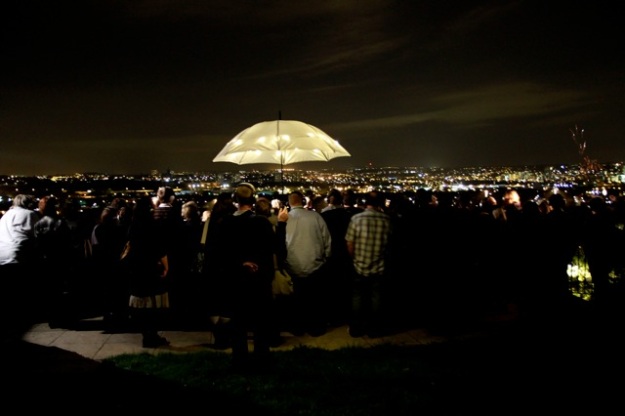 We’ve spent a lot of time recently thinking about education. Learning. In various different forms.
We’ve spent a lot of time recently thinking about education. Learning. In various different forms.
Over the years Slung Low have taught at dozens of universities, we were in residence at the University of Huddersfield for 8 years or so, and this year are spending a lot of time at LIPA. We all went to school.
And in preparation for last year’s Flood most members of the team went on a variety of training courses; the writer and composer on a 3 day first aid course; the designer getting a MEWP ticket, sound engineer an all terrain fork lift licence, producer food hygiene certificate and I did a rope access course with a bunch of recently demobbed marines looking to get a gig on the oil rigs. Learning.
And it struck me how much education, not just the industry of it but the philosophy of learning had changed over the last 30 years.
There’s a solid looking coffee table in my house. It’s moved house with me a dozen times, it is sturdy thing. Handsome, practical. My mother made it. Probably 35 years ago. In a wood working class the WI ran one autumn. Taught her to make a table. Proper joinery. Took a while. It is a good table. Skills. Learnt.
You see less of that now. The WI- and a whole hosts of other organisations that might have been interested in the general cultural well-being and education of their members and the wider population now pressed into service as a third sector, volunteer army of social fire fighters in the battle against the worst ravages of free-market crony capitalism that blights many of the communities that not so long ago didn’t consider themselves in desperate need. Soup kitchens, food banks. That’s what is needed now from the WI and their like. Not so much joinery.
In their place the market has done its thing, you can take your hen do on butchery weekends, learn how to bake French pastries at private cooking schools in evening sessions. There are craft classes that follow a similar pattern. My wife sent me on a Thai cooking day for a birthday but with prices north of £100 a day these are no longer the community adult education of before and well beyond the pockets of many.
And then there’s training. Skills. I work for you and you want me to learn how to use a forklift. So you send me on a course. And the parameters of that learning are carefully framed so it takes up the least amount of time away from work as possible. The hard edges of what will be taught is entirely in relation to what is immediately useful. But you get a certificate. Which is good. Because you pass a test. I should know I did at least a dozen of them last year. They all go a bit like this: The pass rate is 80%. 20% of the questions require actual knowledge. 80% of the questions are structured like this-
What should you always do before preparing food? A. Wash your hands. B. Sing two verses of Bon Jovi’s Living on a Prayer C. No dogs are allowed in the smoking compartment. D. Lick a picture of Delia Smith.
Because the companies supplying the certificates are being assessed by the employer paying on how many can you get through how quickly. Yes you can throw the odd dickhead out of class who won’t take it seriously but fundamentally the bar of knowledge is set at what the existing work force can manage. The market has dictated how much knowledge you are ever going to be offered, then give you a piece of paper to cover your bosses’ asses.
And the universities have changed beyond recognition but we all know that. The wheeze to make students customers has sucked the soul out of the university experience in many ways; just look at how profoundly unhappy so many lecturers are, how changed and reduced their relationship with the students is. The language of the market has done nothing to make students more engaged with their education, let alone more in control. And the customer/service relationship is now being pushed to its natural conclusion- the proposal of rating courses according to the earning power of its graduates is a wonderful idea because it will surely lay bare the inequalities of both our education and employment markets as we all scratch our heads wondering why for the 12th year running PPE graduates of two universities earn more money than graduates of engineering courses anywhere. The drive to the market place is seen in how the students behave, how the lecturers are treated, how the institutions present themselves to the world and in the borrowing of the worst elements of free enterprise in obscene pay at the top and prolonged industrial action at the bottom.
We as a society no longer (in any great number) have many affordable opportunities to learn for the sake of learning. The Liverpool mosque of Quilliam in astronomy, chemistry and maths. The craft courses of the church of England and the WI I remember from my childhood. Lecturer programmes of working men’s clubs and libraries. Ha! Libraries.
Over the last few years we’ve run a very modest, and reasonably traditional, cultural learning programme, a writers’ group run by Mark Catley and Aisha Khan, a choir and a programme of How To Festivals (combining with the mighty Fun Palaces once a year). A small test bed of activity over time, supported by our local councillors and community funding, that has allowed us to hear about the impact from our community that a cultural learning for cultural learning’s sake can have. The self-declared outcomes in our participants, on their well-being, on their imagination, on their cultural capital and confidence has been incredibly bolstering to hear and inspired much thinking. As modest as it was the impact is clear, what impact could a more ambitious project have?
My father left school for the RAF at 15 with a wood work O-level. The RAF taught him everything he needed to know. And then in later life, still in the forces, he did an Open University degree. In humanities, social sciences. Utterly pointless to any job he would ever have, any career development available to him at GCHQ. He’s been dead a long time now but one of the clearest memories I have is of him turning to me and my mum at tea one day and with complete horror and genuine surprise detailing how he’d just learnt how appallingly homosexuals had been treated in our country by the law. Genuine revelation of knowledge. A man’s mind transformed simply by coming to know more. Learning. Learning undertaken just because he’d reached an age where he wanted to know about things he didn’t know anything about. To know of a different world. And because the forces-whatever their many failings and problems- are still one of the few employers who will fund the educational improvement of their employees even though it may have no immediate bearing on the work they are doing.
His horizon shifted. What a gift to give someone in their middle age. A shifting horizon.
Learning.
Slung Low have started preparations for a Cultural Community College. A place to come and learn, free at the point of use, a whole array of cultural activity; from Irish dancing to South Indian cooking, from poetry writing to carpentry, digital photography to singing in a choir. If I have my way (reader I will) the first course will be star gazing; profound knowledge, awe inspiring, practically useless. I can’t think of anything more changing of horizons than to understand the skies above us. And I can’t think of anything less useful to the market place. In the first wave of classes (different times of the week, different levels of commitment, varied levels of regularity) I have my heart set on welding and how to make the perfect pakora, CPR classes and sign language.
I’ll have to be quick because after the first instalment of classes the curriculum will be chosen by the members of the college, a co-op. If you have attended any class you automatically become a member, you propose classes and vote for your choice; we’ll do what the people decide.
We’ll hire the best teachers we can find and afford.
Someone asked me a few weeks back, why? We make big theatre shows, with a degree of success that would probably ensure we need not do anything else but that. The running of the HUB as a rehearsal space and erstwhile performance space for younger artists takes up more than enough time- why do something else?
Partly it’s our continued core mission to attempt to be as useful as possible with public money in as many imaginative ways as we can.
But mostly it’s because, as Lorne Campbell’s The Last Ship recently reminded in glorious style, you are what you do. That’s as true for organisations as it is for individuals. And I want Slung Low to be a thing that tries to imagine better versions of reality than this current shit show.
I was in an interview a long time ago and I proposed hosting the soon to be closed nearby library in the large and almost constantly empty foyer of the theatre. The chair of the board fell about laughing in a manner that made it clear I wouldn’t need to move house any time soon. “That’s not what we are for” he chuckled. What are you for then? That’s exactly what you should be for actually. That’s exactly what the privilege and opportunity of public funding is for. As I have written here before the need to imagine and explore new ways of being, of valuing things are urgent. And if it’s not the job of subsidised arts organisations then I don’t know whose it might be. If not us then who? Whilst we’ve spent ten years scrapping to keep the status quo, fighting off cuts and disrespect from our conservative governmental paymasters, other sectors, driven by the profit imperative and with scant regard for the majority of society, have been busy imagining new worlds in which technology plays a greater and greater role requiring a smaller, highly educated workforce but little use for anyone who might find themselves on the wrong end of the technological revolution. Slung Low are going to create a place, a school, where people come to learn news things of wonder and beauty simply for the sake of the joy that such things might bring them. Because I think the people attending deserve that level of attention and provision. And because I think, I hope, it might help. Them, maybe. Society, hopefully. Me, definitely.
There are have been various calls from the theatre scene for arts education to be better respected by the government and they are all absolutely correct. Most can be more or less summarised by these lines from something Rufus Norris wrote a couple of months ago; “We need an education system fit for the 21st century, one that champions this country’s creativity as the foundation of its economic health.”
He’s quite correct but we’ve done this before. It’s the same argument we made for public subsidy for the arts.
The argument was won, funding stabilised, but not before the nature, purpose and logic of arts funding and many of our organisations were transformed. We need an education system fit for the 21st century that champions the country’s creativity as a foundation of its collective mental health, as a foundation of its collective sense of worth, as a foundation of its ability to take a moral leadership role in the world, to imagine better futures for our children, for other people’s children, fuck it for ourselves man.
You don’t wonder why you should bother spending time and money on teaching a factory worker how to paint, or understand geometry, or sing, or to code a raspberry pi, carve a candle stick when that is going to add nothing to the efficiency of the factory they work in, you wonder when it was you came to have such a low opinion of people who work in factories that a full, rich, accessible and varied creative, cultural life might not be something that every single person of the nation deserves. Jesus lads, this is Victorian logic. We are literally less humane and enlightened than owners of Victorian chocolate factories, can we get a grip please.
You are what you do. And so, in our little part of the world in Holbeck, we are going to make a varied, high quality creative education available to everyone who wants it regardless of financial status. Because that’s what we want to be- people who think that is important- so that’s what we’ll do. Hold the space to create the opportunity of a cultural education beyond the market place. We’re going to open a school. It’s going to be an adventure. The first classes will be in autumn 2018 and it will run for four years, forever or until the revolution and/or nuclear war makes it unnecessary. It is possible entirely thanks to the considerable support of the Paul Hamlyn Foundation and our long suffering but much appreciated partners at the Arts Council, England. The college will be supported by an advisory board of educators taken from a range of educational worlds, universities, theatre education departments, the private sector. The excellent Dr Rachel Perry will be coming with us on the journey to research our impact, success and misfires along the way which will allow us to learn what we learn wider than our immediate Holbeck community.
It’s what we’ll be spending a large part of the next few months on, creating the framework of the college. If you have any interest in it, want to argue about it, want to offer help in some way please do get in touch. It takes a village eh.
The picture at the top is of the mighty Rash Dash running a Fairy Rave at the RSC when we tried to learn how to open a portal to the fairy world. Experts and academics are still in disagreement as to whether the operation was successful. The photo was taken by Sam Allard.

